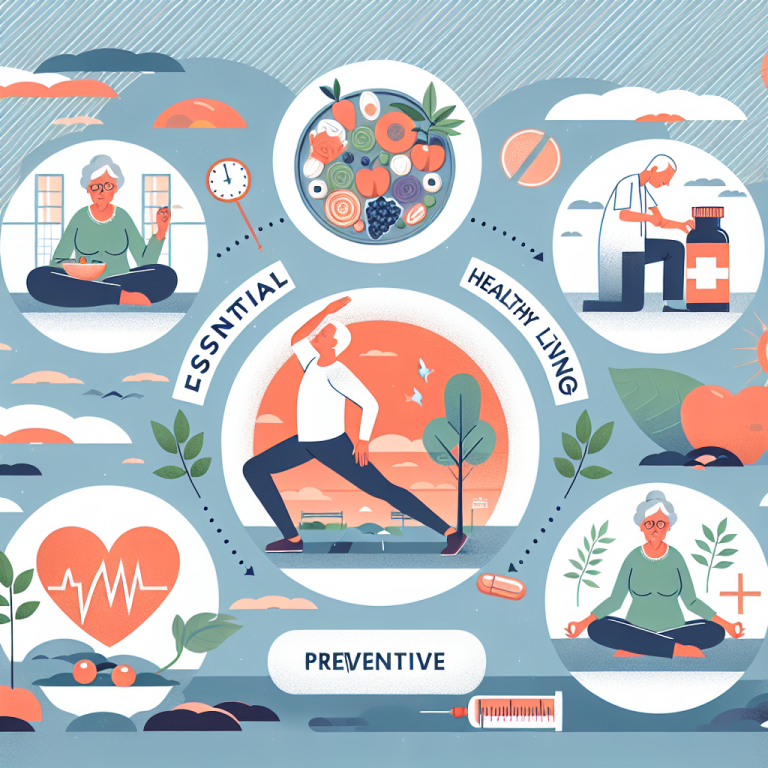Are you a senior looking to maintain a healthy and fulfilling lifestyle? Look no further! In this article, we will provide you with essential tips that will guide you towards a life of vitality and well-being. From adopting a nutritious diet to staying physically active, we have got you covered. So, grab a cup of tea, sit back, and let us help you embark on this journey towards a healthier you.
Exercise Regularly
Regular exercise is essential for maintaining good health and vitality as a senior. There are various types of exercises that are particularly beneficial for seniors.
Types of exercise for seniors
- Cardiovascular exercise: This type of exercise gets your heart rate up and improves circulation. Examples include walking, swimming, cycling, and dancing. Aim for at least 150 minutes of moderate-intensity cardiovascular exercise per week.
- Strength training: Building and maintaining muscle strength is crucial for seniors to prevent age-related muscle loss. Weightlifting, resistance bands, and bodyweight exercises are excellent options.
- Balance and flexibility exercises: These exercises help improve stability and reduce the risk of falls. Yoga, tai chi, and Pilates are great choices that also promote relaxation and mindfulness.
Benefits of regular exercise
Engaging in regular exercise brings numerous benefits to seniors, both physically and mentally. Some of the key advantages include:
- Increased cardiovascular health and reduced risk of chronic diseases such as heart disease, diabetes, and certain cancers.
- Improved joint flexibility and decreased risk of arthritis.
- Enhanced muscle strength, which enhances endurance and reduces the risk of falls and fractures.
- Elevated mood and reduced risk of depression and anxiety.
- Boosted cognitive function and reduced risk of age-related cognitive decline and dementia.
Tips for getting started
If you haven’t been active recently, it’s always a good idea to consult your doctor before starting any exercise regimen. Once you get the go-ahead, here are a few tips to help you get started:
- Start slow and gradually increase intensity and duration over time.
- Choose activities you enjoy to increase motivation and adherence.
- Find an exercise partner or join a group class to make it more enjoyable and social.
- Listen to your body and take rest days when needed.
- Stay hydrated and wear appropriate footwear and clothing for safety and comfort.
Eat a Balanced Diet
Eating a balanced diet is crucial for seniors to maintain optimal health and support overall well-being.

Importance of a balanced diet
A balanced diet provides the necessary nutrients, vitamins, and minerals needed for seniors to thrive and prevent nutritional deficiencies. Key reasons why a balanced diet is important include:
- Providing energy to stay active and maintain a healthy weight.
- Supporting immune function and preventing illness.
- Promoting a healthy digestive system.
- Reducing the risk of chronic diseases such as heart disease, diabetes, and osteoporosis.
Recommended nutrients for seniors
While individual nutrient needs may vary, seniors should focus on including the following in their diet:
- Fiber: Helps maintain digestive health and prevents constipation. Whole grains, fruits, vegetables, and legumes are excellent sources of fiber.
- Calcium and Vitamin D: Essential for bone health and prevention of osteoporosis. Dairy products, leafy greens, and fortified foods are good sources.
- Protein: Important for muscle strength and repair. Lean meats, poultry, fish, beans, and nuts are excellent sources.
- Healthy fats: Promote heart health and provide energy. Avocados, nuts, seeds, and olive oil are sources of healthy fats.
- Vitamin B12: Helps maintain nerve function and prevents anemia. Dairy products, eggs, fish, and fortified foods contain this vitamin.
Meal planning and portion control
To ensure you’re eating a balanced diet, consider the following tips:
- Include a variety of fruits, vegetables, whole grains, lean proteins, and healthy fats in your meals.
- Limit your intake of processed foods, sugary snacks, and beverages high in added sugars.
- Opt for smaller, more frequent meals throughout the day to support digestion and prevent overeating.
- Pay attention to portion sizes to prevent excess calorie intake.
- Drink plenty of water throughout the day to stay hydrated and support digestion.
Stay Hydrated
Proper hydration is vital for seniors to maintain their overall health and well-being.

Significance of proper hydration
Staying hydrated offers a multitude of benefits for seniors, including:
- Regulation of body temperature.
- Maintenance of proper kidney function.
- Lubrication of joints and prevention of muscle cramps.
- Support of digestion and prevention of constipation.
- Improved concentration and cognitive function.
How much water to drink
While individual water needs may vary, a general guideline is to aim for at least 8 cups (64 ounces) of water per day. However, factors such as activity level, climate, and overall health should be taken into consideration.
Tips for staying hydrated
Here are some useful tips to help you stay hydrated throughout the day:
- Keep a reusable water bottle with you and take sips regularly.
- Set reminders or use smartphone apps to ensure you’re drinking enough water.
- Consume water-rich foods such as fruits, vegetables, and soups.
- Limit caffeinated and alcoholic beverages, as they can contribute to dehydration.
- Pay attention to the color of your urine – clear or light yellow indicates proper hydration.
Get Enough Sleep
Quality sleep is essential for seniors to maintain their health, well-being, and cognitive function.

Importance of quality sleep
Getting adequate, restful sleep offers numerous benefits, including:
- Enhanced memory and concentration.
- Improved immune function and disease prevention.
- Regulation of mood and emotions.
- Reduced risk of chronic conditions such as heart disease, diabetes, and obesity.
- Increased energy and overall vitality.
Recommended sleep duration for seniors
While individual sleep needs may vary, most seniors require 7-9 hours of quality sleep per night. It’s important to maintain a consistent sleep schedule, going to bed and waking up around the same time each day.
Tips for improving sleep
If you’re struggling with sleep, try implementing the following strategies:
- Create a sleep-friendly environment: Keep your bedroom dark, quiet, and cool. Invest in a comfortable mattress and pillows.
- Establish a bedtime routine: Engage in relaxing activities, such as reading or taking a warm bath, before bed to signal your body that it’s time to wind down.
- Limit screen time: Avoid electronic devices (such as smartphones, tablets, and TVs) at least an hour before bed.
- Limit caffeine and alcohol intake, as they can disrupt sleep patterns.
- Incorporate regular exercise into your routine, but try to avoid vigorous exercise close to bedtime.
Maintain a Healthy Weight
Maintaining a healthy weight is crucial for seniors to prevent or manage chronic conditions and promote overall well-being.

Risks of obesity in seniors
Seniors who are overweight or obese are more prone to various health risks, including:
- Increased risk of heart disease, high blood pressure, and stroke.
- Higher likelihood of developing type 2 diabetes.
- Increased strain on joints, leading to osteoarthritis and mobility difficulties.
- Higher risk of certain cancers, including breast, colon, and pancreatic cancer.
How to calculate BMI
Body Mass Index (BMI) is a commonly used indicator to assess weight status. To calculate your BMI, divide your weight in kilograms by your height in meters squared. A healthy BMI range for seniors is typically between 18.5 and 24.9.
Tips for achieving and maintaining a healthy weight
- Prioritize a balanced diet: Focus on consuming nutrient-dense foods and controlling portion sizes.
- Engage in regular physical activity: Incorporate a mix of cardiovascular exercise, strength training, and balance exercises.
- Stay consistent: Make healthy lifestyle changes that are sustainable in the long run, rather than resorting to strict diets or temporary weight-loss methods.
- Seek support: Consider working with a registered dietitian or personal trainer to help you create a personalized plan for achieving your weight goals.
- Celebrate small victories: Keep in mind that weight loss and maintenance take time and effort. Celebrate your progress along the way and stay motivated.
Manage Stress
Stress management plays a vital role in maintaining overall well-being and promoting good health for seniors.

Effects of stress on senior health
Experiencing prolonged or chronic stress can have a negative impact on both physical and mental health. Some effects of stress in seniors include:
- Increased risk of heart disease, high blood pressure, and weakened immune system.
- Raised levels of inflammation in the body, which can contribute to various health problems.
- Impaired cognitive function and memory.
- Negative effects on mental health, including anxiety and depression.
Stress management techniques
Here are some effective stress management techniques for seniors to incorporate into their daily routine:
- Practice deep breathing exercises, meditation, or mindfulness to promote relaxation and reduce stress.
- Engage in regular physical activity, as exercise releases endorphins that improve mood and reduce stress.
- Connect with loved ones: Maintain social relationships and seek support from family and friends.
- Engage in hobbies or activities you enjoy to distract your mind from stressors and promote a sense of joy and fulfillment.
- Consider stress-reducing techniques such as acupuncture, massage therapy, or aromatherapy.
Importance of self-care
Taking care of oneself is crucial, especially during times of stress. Prioritize self-care activities that promote relaxation, self-reflection, and rejuvenation. This may include activities such as taking baths, reading, listening to music, practicing hobbies, or spending time in nature.
Take Care of Mental Health
Maintaining good mental health is essential for seniors to enjoy a fulfilling and meaningful life.
Common mental health issues in seniors
Seniors may experience various mental health issues, including:
- Depression: A persistent feeling of sadness, loss of interest, and lack of motivation.
- Anxiety: Intense worry, restlessness, or irrational fears.
- Loneliness and isolation: Feeling disconnected from others and lacking social interaction.
- Cognitive decline: Memory loss, confusion, and difficulty with daily tasks.
Signs and symptoms to watch out for
It’s important to be aware of signs and symptoms that may indicate potential mental health concerns in seniors, such as:
- Persistent sadness or irritability.
- Changes in appetite or sleep patterns.
- Withdrawal from previously enjoyed activities.
- Difficulty concentrating or making decisions.
- Memory problems or confusion.
Coping strategies and resources
If you or a loved one are struggling with mental health, consider the following strategies and resources:
- Seek professional help: Consult a mental health professional who specializes in working with seniors.
- Stay connected: Engage in regular social activities, join community groups, or volunteer.
- Practice mindfulness and stress management techniques to promote mental well-being.
- Take advantage of support groups or therapy sessions designed for seniors.
- Stay informed about mental health resources and helplines in your community or online.
Stay Socially Active
Maintaining social connections is crucial for seniors to support their mental, emotional, and physical well-being.
Benefits of social interaction for seniors
Staying socially active offers a multitude of benefits, including:
- Reduced feelings of loneliness, depression, and anxiety.
- Increased cognitive stimulation and mental well-being.
- Enhanced immune function and overall physical health.
- Improved self-esteem and sense of belonging.
- Increased opportunities for learning and personal growth.
Ways to stay connected with others
There are countless ways to stay socially active and connected with others as a senior:
- Maintain relationships with family and friends by scheduling regular visits or phone/video calls.
- Join clubs, groups, or organizations based on your interests, such as book clubs, hobby groups, or fitness classes.
- Volunteer within your community to support a cause you’re passionate about.
- Attend social events or gatherings specifically organized for seniors, such as senior center activities or group outings.
- Utilize technology to connect with others through social media, online forums, or video conferencing platforms.
Senior-friendly social activities
Engaging in social activities that suit your preferences and physical abilities is essential. Consider the following senior-friendly activities:
- Taking walks or joining walking groups in your community.
- Participating in low-impact exercise classes tailored for seniors, such as water aerobics or chair yoga.
- Playing card games, puzzles, or board games with friends or family.
- Attending cultural events, concerts, or museums.
- Learning new skills, such as painting, knitting, or playing a musical instrument, through classes or workshops.
Maintain Good Oral Health
Oral health plays a significant role in overall health and well-being, particularly for seniors.
The link between oral health and overall health
Maintaining good oral health is vital, as poor oral hygiene can contribute to various health problems, including:
- Gum disease: Linked to an increased risk of heart disease, stroke, and diabetes.
- Malnutrition: Tooth loss or oral pain can compromise proper nutrition and overall health.
- Respiratory infections: Bacteria from the mouth can be inhaled into the lungs, leading to pneumonia or exacerbating existing lung conditions.
- Memory problems: Poor oral health has been associated with cognitive decline and increased risk of Alzheimer’s disease.
Importance of regular dental check-ups
Regular visits to the dentist are essential for seniors to ensure proper oral health. Dental check-ups serve the following purposes:
- Early detection and treatment of dental issues such as cavities, gum disease, or oral cancer.
- Professional cleaning to remove plaque build-up and prevent tooth decay.
- Evaluation of dentures or other dental appliances for proper fit and function.
- Regular oral health education and advice on proper home care practices.
Daily oral hygiene practices
To maintain good oral health between dental visits, follow these daily oral hygiene practices:
- Brush your teeth at least twice a day with a soft-bristled toothbrush and fluoride toothpaste.
- Floss daily to remove plaque and debris from between your teeth.
- Use an antibacterial mouthwash to reduce bacteria and freshen breath.
- Replace your toothbrush every three to four months or when bristles become frayed.
- If you wear dentures, clean them daily and remove them at night to allow your gums to rest.
Prevent Falls
Falls are a common concern for seniors and can lead to serious injuries. Taking proactive measures to prevent falls is essential for maintaining a safe and independent lifestyle.
Common causes of falls in seniors
Understanding the common causes of falls can help you take steps to prevent them. Some factors contributing to falls in seniors include:
- Muscle weakness and poor balance.
- Chronic health conditions, such as arthritis or Parkinson’s disease.
- Medication side effects, including dizziness or drowsiness.
- Hazards in the living environment, such as uneven surfaces, loose rugs, or poor lighting.
Home safety tips
Make your home fall-proof with these safety tips:
- Remove tripping hazards: Secure loose rugs, minimize clutter, and keep pathways clear.
- Improve lighting: Ensure well-lit areas to enhance visibility, particularly in hallways, staircases, and bathrooms.
- Install grab bars and handrails: Place them near toilets, showers, and stairs for added stability and support.
- Use non-slip mats in the bathroom: Prevent slips and falls by placing non-slip mats inside the shower or bathtub and near sinks.
- Declutter and organize: Arrange frequently used items within easy reach to prevent overreaching or bending.
- Wear appropriate footwear: Choose supportive, non-slip shoes that fit well and avoid walking in socks or slippers on smooth surfaces.
Exercises to improve balance and strength
Engaging in regular exercises that improve balance and strength can significantly reduce the risk of falls. Consider the following exercises:
- Heel-to-toe walk: Practice walking, placing one foot in front of the other, heel to toe, in a straight line.
- Standing leg lifts: Stand behind a sturdy chair, hold onto the backrest, and lift one leg to the side while keeping the other foot on the ground. Repeat on the other side.
- Yoga or tai chi: These gentle exercises combine balance, flexibility, and strength training.
- Half squats: Stand with feet shoulder-width apart, slowly lower down into a semi-squat, and then rise back up.
- Toe taps: Sit in a chair and tap your toes on the ground alternately, raising your feet just off the floor.
By incorporating these healthy living tips into your daily routine, you can promote overall well-being, maintain health, and enjoy a fulfilling and vibrant senior life. Remember, it’s never too late to start taking care of yourself, and small changes can make a big difference in how you feel and function. Prioritize your health and well-being to embrace the best version of yourself as a senior.


